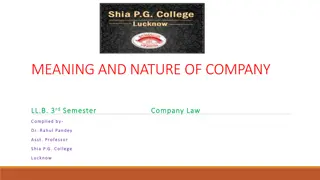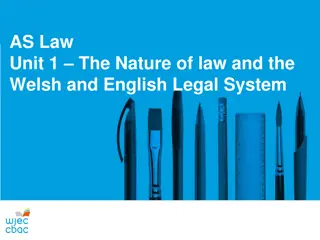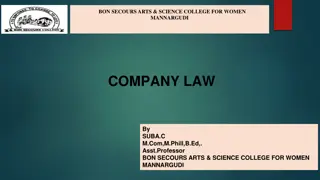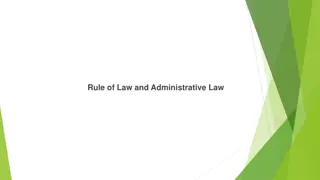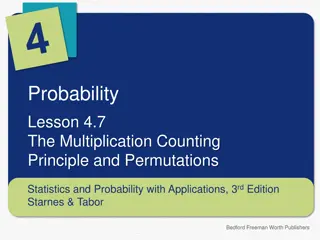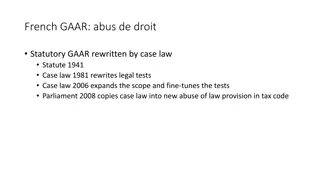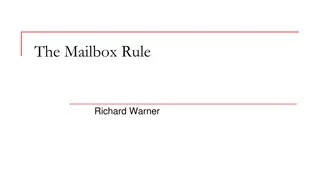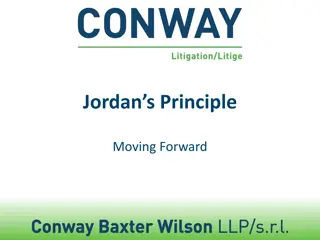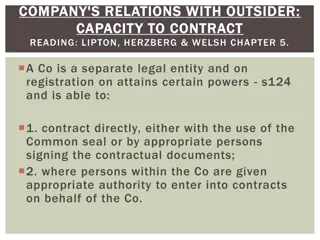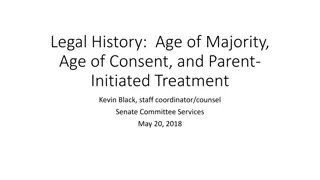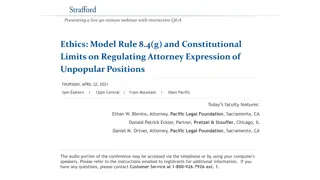Principle of Majority Rule in Company Law
The principle of majority rule is a fundamental aspect of company law, where the powers of control over a company rest with the general meeting representing the majority shareholders. This principle emphasizes that decisions are made by a simple or special majority vote, except for powers vested in the board of directors. Courts typically intervene only in cases where actions cannot be ratified internally or if the company itself is the proper plaintiff when wronged.
Download Presentation

Please find below an Image/Link to download the presentation.
The content on the website is provided AS IS for your information and personal use only. It may not be sold, licensed, or shared on other websites without obtaining consent from the author.If you encounter any issues during the download, it is possible that the publisher has removed the file from their server.
You are allowed to download the files provided on this website for personal or commercial use, subject to the condition that they are used lawfully. All files are the property of their respective owners.
The content on the website is provided AS IS for your information and personal use only. It may not be sold, licensed, or shared on other websites without obtaining consent from the author.
E N D
Presentation Transcript
GOVeRMENT COLLeGE DERA GOVeRMENT COLLeGE DERA BASSI BASSI MAJORITY POWERS AND MAJORITY POWERS AND MINORITY RIGHTS MINORITY RIGHTS
PRINCIPLE OF MAJORITY RULE PRINCIPLE OF MAJORITY RULE Majority must prevail is the fundamental principal of company law . except the powers vested in the board of directors , the overall power are exercised through general meetings and question relation to management are decided either by a simple majority or by a special majority of the votes of the shareholder . It is only the majority of the members who can control the directors POINTS DECIDED ARE POINTS DECIDED ARE 1) The court will not ordinarily intervene in the case of internal irregularity if the matter is one which the company can ratify or condone by its own internal only procedure . 2) Where it is alleged that a wrong has been done to a company , primafacie , the only proper plaintiff is the company itself . Majority must prevail is the fundamental principal of company law . except the powers vested in the board of directors , the overall power are exercised through general meetings and question relation to management are decided either by a simple majority or by a special majority of the votes of the shareholder . It is only the majority of the members who can control the directors. . 1) The court will not ordinarily intervene in the case of internal irregularity if the matter is one which the company can ratify or condone by its own internal only procedure . 2) Where it is alleged that a wrong has been done to a company , primafacie , the only proper plaintiff is the company itself .
WHO CAN BE CALLED A MINORITY WHO CAN BE CALLED A MINORITY The group of shareholders who are not a part of the majority can be cold the minority . It can be single dissident shareholders or a group of shareholders . The group of shareholders who are not a part of the majority can be cold the minority . It can be single dissident shareholders or a group of shareholders . BASIS OF THE RULES BASIS OF THE RULES 1) The right of the majority to rule . The courts have always stressed the principal of majority rule . Courts have taken the view that the ultimate power of control over the company rests with the general meeting which can dictate to the directors in matters of policy . 2) The company is a legal person . A Company is a person at law . The action vested in it and cannot be brought by a single shareholder . 3) The prevention of multiplicity of actions . One of the reasons for the rule in FOSS V . Harbottle is the undesirability of a multiplicity of actions for the same wrong if every member of the minority could procure the aid of the courts . 4) The courts order may be made ineffective leading to unproductive litigation . 1) The right of the majority to rule . The courts have always stressed the principal of majority rule . Courts have taken the view that the ultimate power of control over the company rests with the general meeting which can dictate to the directors in matters of policy . 2) The company is a legal person . A Company is a person at law . The action vested in it and cannot be brought by a single shareholder . 3) The prevention of multiplicity of actions . One of the reasons for the rule in FOSS V . Harbottle is the undesirability of a multiplicity of actions for the same wrong if every member of the minority could procure the aid of the courts . 4) The courts order may be made ineffective leading to unproductive litigation .
Ultra vires and illegal acts Ultra vires and illegal acts EXCEPTIONS TO EXCEPTIONS TO THE RULE IN FOSS THE RULE IN FOSS V . HARBOTTLE V . HARBOTTLE Fraud on the minority Fraud on the minority Wrong doers in control Wrong doers in control Acts requiring special resolution Acts requiring special resolution
PROTECTION OF MINORITY RIGHTS PROTECTION OF MINORITY RIGHTS The minority shareholders should be protected from the unjust or unfair conduct of the majority shareholders . The companies Act 2013 , together with the common law remedies attempts to maintain a balance between the rights of the majority and minority shareholders The minority shareholders should be protected from the unjust or unfair conduct of the majority shareholders . The companies Act 2013 , together with the common law remedies attempts to maintain a balance between the rights of the majority and minority shareholders
THE MINORITY THE MINORITY SHAREHOLDERS SHAREHOLDERS ARE PROTECTED ARE PROTECTED UNDER UNDER The common law The common law The companies Act The companies Act
PROTECTION UNDER COMMON LAW PROTECTION UNDER COMMON LAW The principal of the supremacy of majority of rule in FOSS V . Harbottle is not absolute and is subject to the member of exceptions . IN A NUTSHELL THE COMPANY CANNOT CONFIRM IN A NUTSHELL THE COMPANY CANNOT CONFIRM 1. 1. Any act which is ultra vires the company . 2. 2. Any act which is a fraud on the minority . 3. 3. Any wrong act done by those who are in control . 4. 4. Any Act which amount to Breach of duty by directors . The principal of the supremacy of majority of rule in FOSS V . Harbottle is not absolute and is subject to the member of exceptions . Any act which is ultra vires the company . Any act which is a fraud on the minority . Any wrong act done by those who are in control . Any Act which amount to Breach of duty by directors .
PROTECTION UNDER THE COMPANIES ACT PROTECTION UNDER THE COMPANIES ACT Minority shareholder have been granted various right under the company act 2013 . These rights relate to The variation of class rights . Schemes of reconstruction and amalgamation Minority shareholder have been granted various right under the company act 2013 . These rights relate to The variation of class rights . Schemes of reconstruction and amalgamation . . Right to apply to the tribunal u Right to apply to the tribunal if not satisfied with the scheme of reconstuction and amalgamation . Oppression & mismanagement . The principal of majority rule dose not apply where the majority shareholders treat company has their own property to the detriment of the minority shareholders . . Winding up application . Section 271 permits an individual shareholders to make a winding up petition to the tribunal Right to apply to the tribunal u\ \s 210 to have the affairs of the company investigated. Right to apply to the tribunal if not satisfied with the scheme of reconstuction and amalgamation . Oppression & mismanagement . The principal of majority rule dose not apply where the majority shareholders treat company has their own property to the detriment of the minority shareholders s 210 to have the affairs of the company investigated. 1. 1. 2. 2. 3. 3. Winding up application . Section 271 permits an individual shareholders to make a winding up petition to the tribunal . 4. 4.




